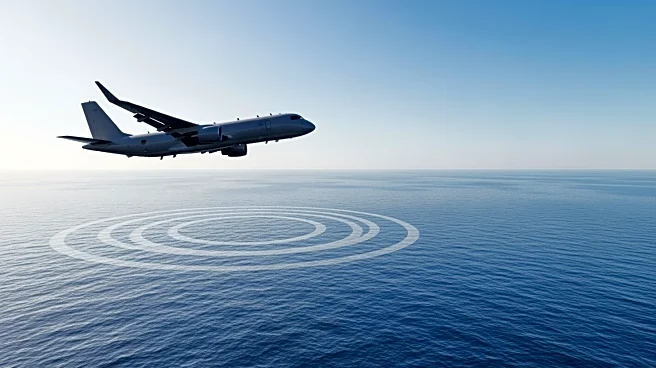What's Happening?
NATO has bolstered its surveillance capabilities in the North Atlantic with the delivery of the German Navy's first P-8A Poseidon aircraft on November 7. This development strengthens NATO's ability to
monitor the GIUK Gap, a strategic sea area between Greenland, Iceland, and the United Kingdom. The GIUK Gap is crucial for tracking Russian nuclear and ballistic missile submarines, which must pass through this region to access deeper waters in the mid-Atlantic. The German Poseidon fleet will operate from Nordholz Naval Airbase in Germany, collaborating with UK and Norwegian P-8s based in Scotland and Norway, as well as US Navy P-8A aircraft in Iceland. This coordinated effort represents a significant upgrade in NATO's deterrence capabilities against Russian submarine activities.
Why It's Important?
The enhancement of NATO's surveillance capabilities in the North Atlantic is a strategic move to counter Russian military activities. The GIUK Gap is a critical chokepoint for Russian submarines, and improved monitoring in this area strengthens NATO's deterrence against potential threats. The collaboration among German, UK, Norwegian, and US forces ensures comprehensive coverage and rapid response capabilities. This development is particularly significant given the geopolitical tensions involving Russia, Ukraine, and other regions. By enhancing its surveillance infrastructure, NATO aims to maintain stability and prevent escalation in the region.
What's Next?
The integration of the P-8 Poseidon aircraft into NATO's surveillance operations is expected to continue, with further deliveries and training exercises planned. The German Navy's Poseidon fleet will expand to eight aircraft, enhancing its operational capacity. As NATO strengthens its presence in the North Atlantic, Russia may respond by adjusting its submarine deployment strategies or increasing its military activities in other regions. The ongoing collaboration among NATO members will likely lead to more joint exercises and strategic planning to address emerging threats.
Beyond the Headlines
The deployment of the P-8 Poseidon aircraft highlights the importance of technological advancements in military strategy. The aircraft's capabilities in anti-submarine warfare and intelligence gathering are crucial for maintaining security in the North Atlantic. This development also underscores the significance of international cooperation in addressing global security challenges. As NATO continues to adapt to evolving threats, the role of advanced technology and multinational collaboration will be pivotal in shaping future defense strategies.









